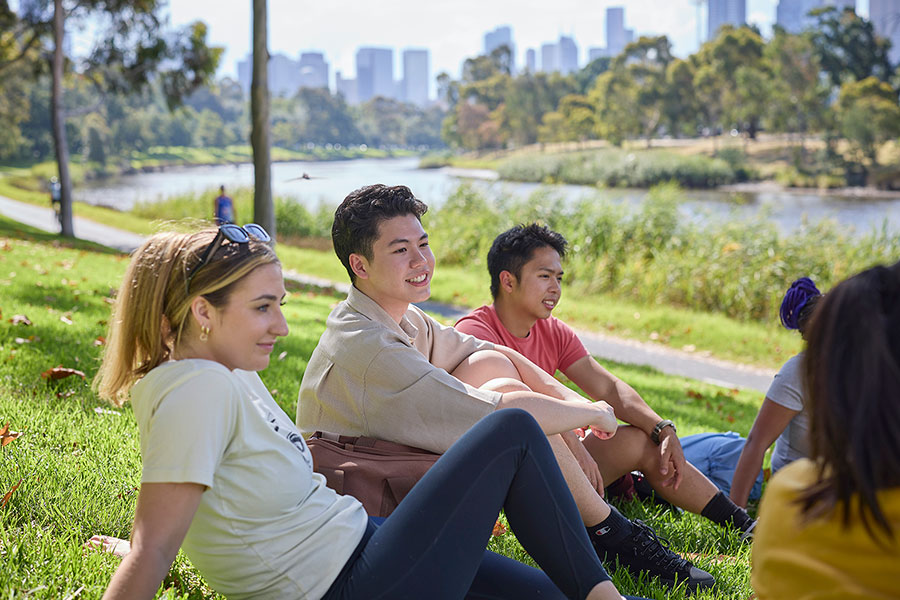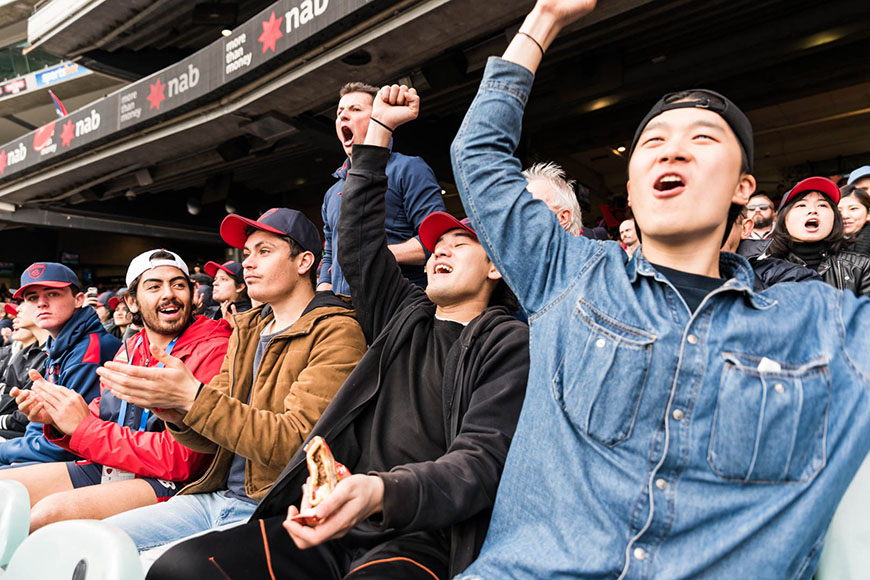One of the most exciting things about studying abroad is experiencing a whole new country.
However, it can be fun, exciting and exhilarating, there may be times when you feel a bit overwhelmed.

Culture shock and homesickness
Culture shock is the sense of disorientation, confusion or uncertainty that people feel when experiencing a different culture. While it’s often associated with negative feelings, it can sometimes be a positive experience, leading to sensations of enlightenment or exhilaration.
Sometimes, people with culture shock may also feel homesick. Homesickness is when you feel sad, upset or distressed at being away from your home, country, family or friends.
It’s important to remember that culture shock and homesickness are common reactions to moving abroad.
While it’s not always possible to avoid them altogether, taking steps to adapt and settle in can help combat culture shock and homesickness, so you can get on with enjoying your time in Melbourne.
Tips for adapting to a new place
View transcript
[Inspiring music, visuals of speaker talking to camera followed montage of speaker enjoying their time in Melbourne including shots of shopping precinct, train station, art gallery, laneways]
Speaker 1: Hi, everyone. Here are the tips that I would like to give myself if I were to move to Melbourne again.
[On-screen text: Be open minded!]
Number one is to be open-minded because you'll meet a lot of people with different backgrounds.
[On-screen text: Take every opportunity you can!]
Number two is take every opportunity you can.
[On-screen text: Explore the city! There's always something to do.]
Number three is explore the city. You can have a look at the library galleries. There's always so much going on in the city.
[On-screen text: Moving to Melbourne has been the best decision I have made!]
Moving to Melbourne, Australia's best student city has been the best decision in my life, and it'll be yours too.
[End transcript]
Learn about Australian culture
Learning more about where you live is a fantastic way to begin feeling at home.
Australians tend to be relaxed and friendly and often use humour and sarcasm. They also use a lot of slang, which can vary between regions. Some common Aussie slang words include:
- ‘Arvo’ (aar-vow) meaning afternoon
- ‘G’day’ (gəˈdeɪ) meaning hello
- ‘Mate’ (meɪt) meaning friend
Understanding a country’s culture can even make it easier to connect with people and make friends.
Explore your new surroundings
A way to minimise culture shock in Australia is to start discovering your new city. By familiarising yourself with the environment and way of life, you will be better able to adjust and settle in.
Get started by putting together a list of things you want to do or places you want to see. This might include museums or art galleries, local markets or upcoming events and festivals. For more inspiration, check out What’s On Melbourne.
Make sure you include some classic Melbourne activities as well, like having brunch in a cool laneway cafe or going to an Australian Football League (AFL) game.

Another good tip is to sign up for a walking tour. This is a great way to get explore and learn about your neighbourhood and its history.
Take part in orientation
In Australia, many educational institutions hold orientation, sometimes called O-Week, the week before a new semester starts.
Filled with fun activities, informative sessions and social events, orientation is your chance to kickstart your study experience.
Make the most of your orientation by signing up for lots of information sessions and activities so you become familiar with your campus and meet new people.
Make new friends
When it comes to homesickness, one of the best cures is to make some new friends.
Try to join some of the clubs or societies at your educational institution, sign up for a local sports team, find a part-time job or become a volunteer.
Plus, don’t forget to check out Study Melbourne’s free international student events.
Look after yourself
The first few weeks of your study abroad experience are sure to be a mix of emotions, activities and excitement, so it’s important to look after yourself.
Maintaining your health and wellbeing includes eating a healthy diet, engaging in regular exercise and getting enough sleep.
It is also important to ensure you maintain a healthy balance between work, study, rest and play. Set aside a few hours each week for self-care, and indulge in something relaxing like an at-home movie day, a nice walk or even just curling up with a good book.
Stay in touch
Modern technology makes it easier than ever to stay connected to your loved ones back home while you are away. If you find yourself missing your friends and family members, consider arranging a phone call or video chat. This kind of interaction can work wonders
Ask for help
If you are experiencing homesickness or culture shock in Melbourne, it’s important to remember that you are not alone. If you are finding the transition difficult and you would like to talk to someone, there are lots of resources on offer.
Your education provider is a great first point of contact, as they often have a dedicated international student support team. You can even connect with people from your country or background through cultural clubs at your institution or via the Victorian Multicultural Commission.
Finally, don’t forget that the team at Study Melbourne is available in person, on the phone and via email to help. Browse the website to access a range of helpful resources - such as online, phone and in-person support services - or drop in to see the friendly team at the Study Melbourne Hub.
Want to learn more? Visit the Living here page, where you can explore further details about life in Melbourne and how to settle in.
Page last updated:
